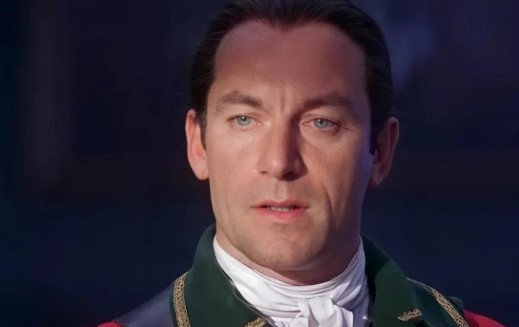Actor playfully critiques Hollywood’s version of history, saying magic feels closer to reality than a Revolutionary War epic
August 25, 2025 — In a moment of dry wit and historical humility, actor Jason Isaacs—famously known for his role as Lucius Malfoy in the Harry Potter films—joked that the beloved fantasy series is “slightly more historically accurate” than his own Revolutionary War drama, The Patriot.
A Tongue-in-Cheek Lesson in Movie Accuracy
In a playful yet pointed interview with Entertainment Weekly, Isaacs said, “I must tell people that Harry Potter is slightly more historically accurate than The Patriot. And any history teacher who’s showing it to their kids, they better tell them how much bulls—– it is. It’s made up.”
Though delivered with humor, Isaacs made a serious point: The Patriot, despite its gripping emotional arc, offers only a loose connection to real history. He highlighted how often the film is misconstrued in classrooms as factual—prompting the need for educators to emphasize its fictional nature.
From Drama to Satire: The Death of Stalin
Isaacs didn’t stop there. He also praised the political satire The Death of Stalin, which he starred in, arguing that despite its comedic tone, it offers a surprisingly more grounded portrayal of Soviet power dynamics than The Patriot. A missed gem, he lamented, due to perhaps misleading perceptions about its tone.
Why This Quip Resonates
The irony of exaggeration: It’s telling when a magical, entirely fictional world—complete with wizards and spells—edges closer to reality than a star-studded war drama.
A subtle critique of historical filmmaking: Isaacs’ humor lands a serious critique—Hollywood often prioritizes spectacle over accuracy.
A reminder for educators and viewers alike: Popular films, while engaging, shouldn’t substitute for historical truth.
Quick Background Check
Released in 2000 and directed by Roland Emmerich, The Patriot featured Mel Gibson along with Isaacs as the brutal Colonel Tavington. While the film drew significant box-office attention—grossing over $215 million on a $110 million budget—it faced criticism for its fictionalized representation of Revolutionary War events and characters, like the composite hero Benjamin Martin or the exaggerated villainy of Tavington. Wikipedia
By contrast, Harry Potter is celebrated for its world-building, character arcs, and enduring impact—just not its historical grounding (obviously). Yet Isaacs’ remark cleverly flips the humdrum expectations of accuracy on their head.
In Summary
Jason Isaacs’ quip—that Harry Potter edges out The Patriot in historical plausibility—is equal parts jest and a critique. It shines a light on the blurred lines between fiction and perceived truth in cinema and underscores the importance of critical viewing—even when watching genre fantasies or patriotic epics.
Published by HOLR Magazine


